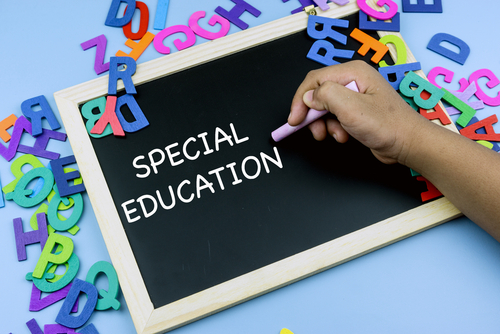School Legal Issues Every Student, Parent and Educator Should Know
As our public schools have changed, so too have the laws governing education in the State of New Jersey. Education laws and the rights of students, teachers and parents are also now very different than they were just a few years ago.
Public Schools in New Jersey

The new school year is here and public schools in the State of New Jersey are a very different place than they were when this old education lawyer and father of four last attended public school. Even my four children, who have and/or who are presently attending public school in the same New Jersey town as their siblings, have also had very different public school experiences. As a parent of children ages 16 to 31 and education lawyer for the past 30+ years, I’ve seen, firsthand, how different public schools in New Jersey have become from when our oldest child graduated high school back in 2007. The very same high school our 16 year now attends is a very different high school than her older siblings attended. The emphasis on core curriculum, safety concerns, special education, testing and evaluations, value-centered mindfulness-based education, individual student rights, confidentiality concerns, open public meetings, etc. have all “evolved” from when my oldest children attended public school, let alone from when I last attended public school.

Changing Laws in NJ Public Schools
As our public schools have changed, so too have the laws governing education in the State of New Jersey. Education laws and the rights of students, teachers and parents are also now very different than they were just a few years ago; education laws now include many more statutes, regulations and caselaw precedents that touch upon the rights of students, parents, teachers, administrators. These new laws can really make a meaningful impact in the life of a public school student in the State of New Jersey. These issues should accordingly be addressed with a “child-centered attorney” before the new school year begins and, if already addressed, closely monitored once the new school year begins. These issues include, but are not limited, to the following “back to school” legal issues:
Bullying

According to the National Center for Education Statistics and Bureau of Justice, 90% of students in grades 4-8 report having been harmed or bullied, and 28% of students in grades 6-12 experience bullying. Bullying can be physical, verbal, social and electronic. Social bullying is common and includes exclusion, spreading rumors and stories, as well as alienating other students from social acceptance and interaction.
Cyber bullying occurs via the internet or through electronic medium and can occur through:
- Text messaging
- Photo/video clips via cell phone camera
- Instant messaging
- Chat room websites
This type of bullying, unlike the traditional school bullying from decades past, can occur 24/7. The issue of harassment, intimidation and bullying has been addressed by the state of New Jersey. Under New Jersey law, “harassment, intimidation, or bullying” is defined to include “…any gesture, any written, verbal or physical act, or any electronic communication, whether it be a single incident or a series of incidents, that is reasonably perceived as being motivated either by any actual or perceived characteristic, such as race, color, religion, ancestry, national origin, gender, sexual orientation, gender identity and expression, or a mental, physical or sensory disability, or by any other distinguishing characteristic, that (a) a reasonable person should know, under the circumstances, will have the effect of physically or emotionally harming a student or damaging the student’s property, or placing a student in reasonable fear of physical or emotional harm to his person or damage to his property; (b) has the effect of insulting or demeaning any student or group of students; or (c) creates a hostile educational environment for the student by interfering with a student’s education or by severely or pervasively causing physical or emotional harm to the student.”
Special Education

The Individuals with Disabilities Education Act (IDEA) is a federal statute which has been incorporated into New Jersey state law and resulted in many regulations designed to ensure that all disabled children of the State of New Jersey are afforded a meaningful educational program tailored to their individual needs; the IDEA requires that all disabled students in the state of New Jersey received a free and appropriate education (FAPE) in the least restrictive environment (LRE) beginning as early as the age of 3 years old. Proactivity in the area of special education cannot be stressed enough; the sooner parents get started addressing potential developmental delays with their medical providers and advocating for those services available through the school system, the better.
School Safety

Sadly, the number and rate of school shootings has risen dramatically in the last half century. There were 82 school shootings in the United States in 2018. While today’s parents may feel a sense of anxiety every day when they send their child off to school, it may be comforting to know that New Jersey has extensive regulations designed to address the issue of school safety; including the implementation of school safety, security plans and security drills. These are not the duck and cover drills of past generations. Thankfully, we no longer believe that our kids will be safe just by ducking under their desks for cover.
School Testing

In June of 2019, the New Jersey Department of Education extended the graduation rules for juniors and seniors for two years. Current freshman and sophomore students may pass an alternate exam in Math & English (SAT or ACT) rather than the state standardized test (NJSLA) which replaced the PARCC test. Students who pass the NJSLA tests can also use them to meet the state’s standardized testing requirements. State law says all students must pass a standardized test in English and Math during 11th grade in order to graduate High School. The use of and importance of standardized testing has accordingly not only changed in the past, but appears to be an area of the law that legislators, administrators and educators are ready to potentially revisit, yet again. Those parents concerned with testing should, accordingly, proactively address these issues before, rather than after, they receive notices and requirements regarding testing, graduation, etc.
Contact an Education Law Attorney to Discuss Your Child’s School Year in New Jersey
The attorneys at Davis and Mendelson would welcome the opportunity to help any concerned parents, teachers, administrators and/or students address any of the above-discussed issues in a child-centered manner to both advocate and, ideally, resolve whatever education issues you may have. Happy Summer!
The articles on this blog are for informative purposes only and are no substitute for legal advice or an attorney-client relationship. If you are seeking legal advice, please contact our law firm directly.
